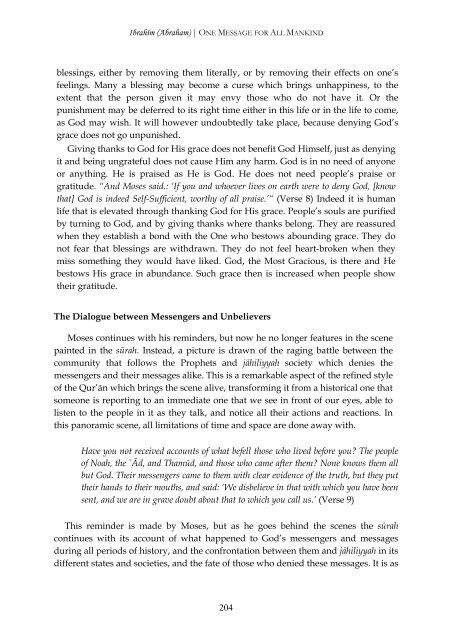Volume 10 Surah 12 - 15 - Enjoy Islam
Volume 10 Surah 12 - 15 - Enjoy Islam
Volume 10 Surah 12 - 15 - Enjoy Islam
You also want an ePaper? Increase the reach of your titles
YUMPU automatically turns print PDFs into web optimized ePapers that Google loves.
Ibrahīm (Abraham) | ONE MESSAGE FOR ALL MANKIND<br />
blessings, either by removing them literally, or by removing their effects on one’s<br />
feelings. Many a blessing may become a curse which brings unhappiness, to the<br />
extent that the person given it may envy those who do not have it. Or the<br />
punishment may be deferred to its right time either in this life or in the life to come,<br />
as God may wish. It will however undoubtedly take place, because denying God’s<br />
grace does not go unpunished.<br />
Giving thanks to God for His grace does not benefit God Himself, just as denying<br />
it and being ungrateful does not cause Him any harm. God is in no need of anyone<br />
or anything. He is praised as He is God. He does not need people’s praise or<br />
gratitude. “And Moses said.: ‘If you and whoever lives on earth were to deny God, [know<br />
that] God is indeed Self-Sufficient, worthy of all praise.’“ (Verse 8) Indeed it is human<br />
life that is elevated through thanking God for His grace. People’s souls are purified<br />
by turning to God, and by giving thanks where thanks belong. They are reassured<br />
when they establish a bond with the One who bestows abounding grace. They do<br />
not fear that blessings are withdrawn. They do not feel heart-broken when they<br />
miss something they would have liked. God, the Most Gracious, is there and He<br />
bestows His grace in abundance. Such grace then is increased when people show<br />
their gratitude.<br />
The Dialogue between Messengers and Unbelievers<br />
Moses continues with his reminders, but now he no longer features in the scene<br />
painted in the sūrah. Instead, a picture is drawn of the raging battle between the<br />
community that follows the Prophets and jāhiliyyah society which denies the<br />
messengers and their messages alike. This is a remarkable aspect of the refined style<br />
of the Qur’ān which brings the scene alive, transforming it from a historical one that<br />
someone is reporting to an immediate one that we see in front of our eyes, able to<br />
listen to the people in it as they talk, and notice all their actions and reactions. In<br />
this panoramic scene, all limitations of time and space are done away with.<br />
Have you not received accounts of what befell those who lived before you? The people<br />
of Noah, the `Ād, and Thamūd, and those who came after them? None knows them all<br />
but God. Their messengers came to them with clear evidence of the truth, but they put<br />
their hands to their mouths, and said: ‘We disbelieve in that with which you have been<br />
sent, and we are in grave doubt about that to which you call us.’ (Verse 9)<br />
This reminder is made by Moses, but as he goes behind the scenes the sūrah<br />
continues with its account of what happened to God’s messengers and messages<br />
during all periods of history, and the confrontation between them and jāhiliyyah in its<br />
different states and societies, and the fate of those who denied these messages. It is as<br />
204

















